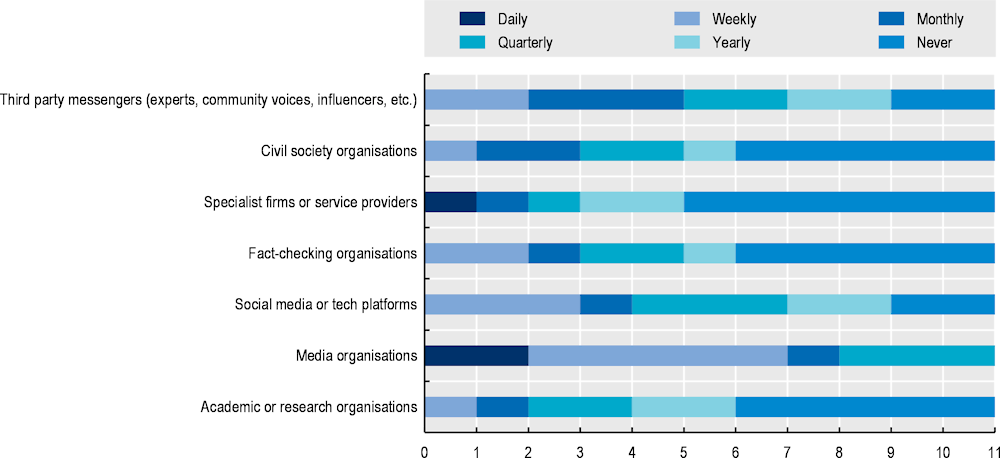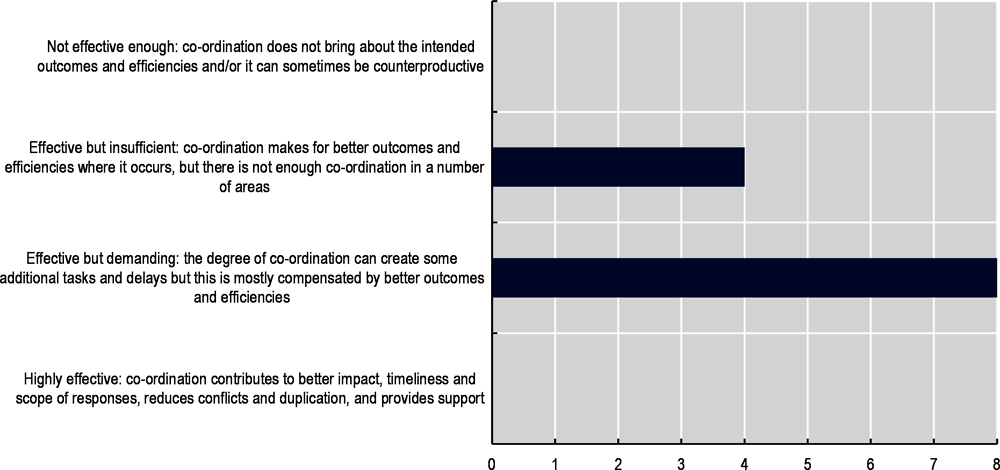[53] Alfonsi, C. et al. (2022), “Public communication trends after COVID-19: Innovative practices across the OECD and in four Southeast Asian countries”, OECD Working Papers on Public Governance, No. 55, OECD Publishing, Paris, https://doi.org/10.1787/cb4de393-en.
[83] Barnes, J. (2022), “Russia steps up propaganda war amid tensions with Ukraine”, New York Times, https://www.nytimes.com/2022/01/25/us/politics/russia-ukraine-propaganda-disinformation.html (accessed on 1 March 2023).
[35] Barwick, S. (2019), “Impartiality matters: Perspectives on the importance of impartiality in the civil service in a “post truth” world”, The Smith Institute, https://www.smith-institute.org.uk/book/impartiality-matters-perspectives-on-the-importance-of-impartiality-in-the-civil-service-in-a-post-truth-world/ (accessed on 27 March 2023).
[79] Baugh, S. (2022), “Responding to Russia’s invasion”, Government Communication Service, https://gcs.civilservice.gov.uk/news/responding-to-russias-invasion/ (accessed on 1 March 2023).
[37] BBC (2022), “Sue Gray report: No 10 apologises for misleading journalists over Partygate”, https://www.bbc.co.uk/news/uk-politics-61595965 (accessed on 23 March 2023).
[30] BBC (2021), “BBC Action Plan, incorporating the response to the Serota Review”, https://downloads.bbc.co.uk/aboutthebbc/reports/reports/impartiality-and-editorial-standards-action-plan.pdf (accessed on 31 March 2023).
[75] Bernigaud, A. (2023), “Defending the vote: France acts to combat foreign disinformation”, Princeton University, https://successfulsocieties.princeton.edu/sites/successfulsocieties/files/France_AB_Viginum_.pdf.
[94] Big Brother Watch (2023), Ministry of Truth: The Secretive Government Units Spying on Your Speech, https://bigbrotherwatch.org.uk/wp-content/uploads/2023/01/Ministry-of-Truth-Big-Brother-Watch-290123.pdf.
[29] Blastland, M. and A. Dilnot (2022), “Review of the impartiality of BBC coverage of taxation, public spending, government borrowing and debt”, https://www.bbc.co.uk/aboutthebbc/documents/thematic-review-taxation-public-spending-govt-borrowing-debt.pdf (accessed on 27 March 2023).
[45] Cabinet Office (2016), Code of Conduct for Special Advisors, https://assets.publishing.service.gov.uk/government/uploads/system/uploads/attachment_data/file/832599/201612_Code_of_Conduct_for_Special_Advisers.pdf.
[46] Cain, L. (2021), “Modernising the Government Communication Service”, Institute for Government, https://www.instituteforgovernment.org.uk/sites/default/files/publications/modernising-government-communications-service.pdf (accessed on 27 March 2023).
[60] Canadian Commission on Democratic Expression (n.d.), “Examining the impact of digital technologies on Canadian society”, Canadian Citizens’ Assemblies on Democratic Expression, https://www.commissioncanada.ca/ (accessed on 28 April 2023).
[31] Cazenave, E. and A. Bellantoni (2022), “Accessible and inclusive public communication: Panorama of practices from OECD countries”, OECD Working Papers on Public Governance, No. 54, OECD Publishing, Paris, https://doi.org/10.1787/222b62d9-en.
[27] Christie, L. (2021), “COVID-19 vaccine misinformation”, https://post.parliament.uk/covid-19-vaccine-misinformation/ (accessed on 30 May 2023).
[11] Curtice, J. (2018), “The emotional legacy of Brexit: How Britain has become a country of ’Remainers’ and ’Leavers’”, https://whatukthinks.org/eu/wp-content/uploads/2018/10/WUKT-EU-Briefing-Paper-15-Oct-18-Emotional-legacy-paper-final.pdf (accessed on 24 March 2023).
[72] DCMS (2022), Counter Disinformation Unit: Social Media (written question), Department for Digital, Culture, Media and Sport, https://www.theyworkforyou.com/wrans/?id=2022-03-31.151118.h.
[87] DCMS (2022), Disinformation: Russia (written question), Department for Digital, Culture, Media and Sport, https://questions-statements.parliament.uk/written-questions/detail/2022-03-01/132252 (accessed on 30 May 2023).
[67] DCMS (2022), UK Digital Strategy, Department for Digital, Culture, Media and Sport, https://assets.publishing.service.gov.uk/government/uploads/system/uploads/attachment_data/file/1089103/UK_Digital_Strategy_web_accessible.pdf (accessed on 30 May 2023).
[68] DCMS (2021), Online Media Literacy Strategy, Department for Digital, Culture, Media and Sport, https://www.gov.uk/government/publications/online-media-literacy-strategy (accessed on 30 May 2023).
[71] DCMS (2020), Letter by Caroline Dineange MP to Lord Puttnam, Department for Digital, Culture, Media and Sport, https://committees.parliament.uk/publications/1280/documents/11300/default/ (accessed on 30 May 2023).
[17] DCMS (2018), “Tackling the threat to high-quality journalism in the UK”, Department for Digital, Culture, Media and Sport, https://www.gov.uk/government/news/tackling-the-threat-to-high-quality-journalism-in-the-uk (accessed on 24 March 2023).
[86] Dickson, A. (2022), “Britain’s (opaque) war on Russian propaganda”, Politico, https://www.politico.eu/article/the-uk-counter-disinformation-russia-kremlin-cdu-media/ (accessed on 17 January 2023).
[10] Duffy, B. et al. (2019), Divided Britain? Polarisation and Fragmentation Trends in the UK, The Policy Institute at King’s College London, https://kclpure.kcl.ac.uk/portal/files/130870306/divided_britain.pdf (accessed on 24 March 2023).
[8] Edelman (2023), 2023 Edelman Trust Barometer, https://www.edelman.com/trust/2023/trust-barometer (accessed on 24 March 2023).
[13] Edelman (2023), 2023 Edelman Trust Barometer - UK Supplement Report, https://www.edelman.co.uk/sites/g/files/aatuss301/files/2023-03/UK%20Trust%202023%20Website.pdf (accessed on 28 April 2023).
[25] Edelman (2022), Edelman Trust Barometer 2022, https://www.edelman.com/sites/g/files/aatuss191/files/2022-01/2022%20Edelman%20Trust%20Barometer%20FINAL_Jan25.pdf.
[22] Full Fact (2023), “£7 million daily cost of hotel accommodation includes cost of housing Afghan refugees”, https://fullfact.org/immigration/hotel-accommodation-asylum-seeker-cost/ (accessed on 23 March 2023).
[70] Full Fact (2022), Full Fact Report 2022, https://fullfact.org/media/uploads/full-fact-report-2022.pdf (accessed on 27 March 2023).
[38] Garland, R. (2022), “No. 10 Press Office: The autonomy to government communications to behave appropriately in relation to their own codes and to provide a public service has been depleted”, London School of Economics, https://blogs.lse.ac.uk/politicsandpolicy/no10-press-office-political-spin/ (accessed on 24 March 2023).
[36] Garland, R. (2021), Government Communications and the Crisis of Trust From Political Spin to Post-truth, Springer.
[15] Garland, R., D. Tambini and N. Couldry (2017), “Has government been mediatized? A UK perspective”, London School of Economics, http://eprints.lse.ac.uk/70662/1/Garland_Has%20government%20been%20mediatized%20a%20UK%20perspective_author_2017%20LSERO.pdf (accessed on 28 March 2023).
[55] GCS (2023), “Introducing the UK Government Communication Plan”, Government Communication Service, https://gcs.civilservice.gov.uk/blog/introducing-the-uk-government-communication-plan/ (accessed on 30 May 2023).
[43] GCS (2022), Government Communication Service Propriety Guidance, Government Communication Service, https://gcs.civilservice.gov.uk/publications/propriety-guidance/#:~:text=Government%20Communication%20Service%20Propriety%20Guidance%20defines%20how%20civil%20servants%20can,government%20communications%20by%20successive%20administrations (accessed on 27 March 2023).
[32] GCS (2022), Performance With Purpose: Government Communication Service Strategy, Government Communication Service, https://strategy.gcs.civilservice.gov.uk/wp-content/uploads/2022/05/gcs-strategy-2022-25.pdf (accessed on 10 January 2023).
[82] GCS (2022), RESIST 2 Counter Disinformation Toolkit, Government Communication Service, https://gcs.civilservice.gov.uk/publications/resist-2-counter-disinformation-toolkit/.
[95] GCS (2022), The Wall of Beliefs, Government Communication Service, https://gcs.civilservice.gov.uk/wp-content/uploads/2022/09/Wall_of_Beliefs_-publication.pdf.
[96] GCS (2021), Case Studies: Tackling Disinformation, Government Communication Service, https://gcs.civilservice.gov.uk/guidance/media/media-case-studies/case-studies-tackling-disinformation/ (accessed on 22 March 2023).
[77] GCS (2018), “Alex Aiken introduces the Rapid Response Unit”, Government Communication Service, https://webarchive.nationalarchives.gov.uk/ukgwa/20200203104056/https://gcs.civilservice.gov.uk/news/alex-aiken-introduces-the-rapid-response-unit/ (accessed on 20 February 2023).
[74] Government of Canada (2023), Critical Election Incident Public Protocol, https://www.canada.ca/en/democratic-institutions/news/2023/02/critical-election-incident-public-protocol.html.
[73] Government of Canada (2020), The Critical Election Incident Public Protocol, https://www.canada.ca/en/democratic-institutions/news/2020/10/the-critical-election-incident-public-protocol.html.
[51] Government of Canada (n.d.), Advertising Oversight Mechanism, Treasury Board Secretariat, https://www.canada.ca/en/treasury-board-secretariat/services/government-communications/advertising-oversight-mechanism.html.
[52] Government of Canada (n.d.), Policy on Communications and Federal Identity, https://www.tbs-sct.canada.ca/pol/doc-eng.aspx?id=30683.
[47] Gregory, A. (2012), “UK Government communications: Full circle in the 21st century?”, Public Relations Review, Vol. 38/3, pp. 367-375, https://doi.org/10.1016/j.pubrev.2012.01.002.
[80] Gunter, J. and O. Robinson (2018), “Sergei Skripal and the Russian disinformation game”, BBC, https://www.bbc.com/news/world-europe-45454142.
[81] Harding, L. (2018), “’Deny, distract and blame’: How Russia fights propaganda war”, The Guardian, https://www.theguardian.com/uk-news/2018/may/03/russia-propaganda-war-skripal-poisoning-embassy-london.
[49] HMRC (2022), The HMRC Charter, HM Revenue and Customs, https://www.gov.uk/government/publications/hmrc-charter/the-hmrc-charter.
[78] Home Office (2023), Research, Information and Communications Unit (written question), https://questions-statements.parliament.uk/written-questions/detail/2023-02-27/153945# (accessed on 30 May 2023).
[64] House of Lords (2022), “Freedom of expression online: Communications and Digital Committee report”, https://lordslibrary.parliament.uk/freedom-of-expression-online-communications-and-digital-committee-report/ (accessed on 28 April 2023).
[61] Jäske, M. et al. (2021), Citizens’ Panel on the Freedom of Expression: Recommendations for Measures to Be Taken in Finland to Protect People in Public Professions from Hate Speech and to Safeguard Free Expression of Opinion, https://avoinhallinto.fi/assets/files/2021/03/Citizens_Panel_on_the_Freedom_of_Expression-Final_Report.pdf.
[9] Juan-Torres, M., T. Dixon and A. Kimaram (2020), Britain’s Choice: Common Ground and Division in 2020s Britain, More in Common, https://www.britainschoice.uk/.
[26] Kersley, A. (2022), “Two-thirds of British people worry about the spread of fake news”, Press Gazette, https://pressgazette.co.uk/news/british-fake-news/ (accessed on 24 March 2023).
[92] Lapowsky, I. (2019), “How Cambridge Analytica sparked the great privacy awakening”, Wired, https://www.wired.com/story/cambridge-analytica-facebook-privacy-awakening/ (accessed on 30 May 2023).
[21] Leveson, B. (2012), An Inquiry Into the Culture, Practices, and Ethics of the Press: Executive Summary, https://assets.publishing.service.gov.uk/government/uploads/system/uploads/attachment_data/file/229039/0779.pdf.
[84] Lombardi, P. (2022), “UK warns of Kremlin plans to install new leadership in Ukraine”, Politico, https://www.politico.eu/article/russia-plan-coup-ukraine-uk-foreign-office/.
[40] Macnamara, J. (2020), Beyond Post-Communication: Challenging Disinformation, Deception, and Manipulation, Peter Lang.
[18] Maher, B. (2023), “At least 1,000 jobs cut in English-language news media in January”, Press Gazette, https://pressgazette.co.uk/media_business/2023-journalism-news-job-cuts-redundancies/ (accessed on 24 March 2023).
[85] Malnick, E. (2022), “Inside the secret government unit returning fire on Vladimir Putin’s ‘weaponised lies’”, The Telegraph, https://www.telegraph.co.uk/news/2022/03/19/inside-secret-government-unit-returning-fire-vladimir-putins/ (accessed on 17 January 2023).
[2] Matasick, C., C. Alfonsi and A. Bellantoni (2020), “Governance responses to disinformation: How open government principles can inform policy options”, OECD Working Papers on Public Governance, No. 39, OECD Publishing, Paris, https://doi.org/10.1787/d6237c85-en.
[14] Mayhew, F. (2020), “National newspaper ABCs: Daily Mail closes circulation gap on Sun to 5,500 copies”, Press Gazette, https://pressgazette.co.uk/news/national-newspaper-abcs-daily-mail-closes-circulation-gap-on-sun-to-5500-copies/ (accessed on 14 March 2023).
[90] MOD (2023), 77th Brigade - Information Operations, Ministry of Defence, https://www.army.mod.uk/who-we-are/formations-divisions-brigades/6th-united-kingdom-division/77-brigade/ (accessed on 30 May 2023).
[1] More in Common (2021), Itʼs Complicated. People and Their Democracy in Germany, France, Britain, Poland, and the United States., Robert Bosch Stiftung GmbH, https://www.moreincommon.com/media/5yvfykfc/more-in-common-bosch-democracy-full-report-eng.pdf.
[4] Newman, N. et al. (2022), Reuters Institute Digital News Report 2022, Reuters Institute and University of Oxford.
[3] Norris, P. (2022), “Trust in government redux: The role of information environments and cognitive skills”, HKS Faculty Research Working Paper, Series RWP22-001.
[5] OECD (2022), Building Trust and Reinforcing Democracy: Preparing the Ground for Government Action, OECD Public Governance Reviews, OECD Publishing, Paris, https://doi.org/10.1787/76972a4a-en.
[7] OECD (2022), Building Trust to Reinforce Democracy: Main Findings from the 2021 OECD Survey on Drivers of Trust in Public Institutions, OECD, Paris.
[62] OECD (2022), Declaration on Building Trust and Reinforcing Democracy, OECD, Paris, https://legalinstruments.oecd.org/en/instruments/OECD-LEGAL-0484.
[6] OECD (2022), Principles of Good Practice for Public Communication Responses to Mis- and Disinformation, OECD, Paris, https://www.oecd.org/gov/open-government/good-practice-principles-for-public-communication-responses-to-misinformation-and-disinformation.htm.
[41] OECD (2021), OECD Report on Public Communication: The Global Context and the Way Forward, OECD Publishing, Paris, https://doi.org/10.1787/22f8031c-en.
[59] OECD (2020), Innovative Citizen Participation and New Democratic Institutions: Catching the Deliberative Wave, OECD Publishing, Paris, https://doi.org/10.1787/339306da-en.
[12] OECD (2017), Trust and Public Policy: How Better Governance Can Help Rebuild Public Trust, OECD Public Governance Reviews, OECD Publishing, Paris, https://doi.org/10.1787/9789264268920-en.
[63] OECD (forthcoming), DISMIS Resource Hub Report - Toward a Whole-of-society Approach to Building Societal Resilience, OECD Publishing, Paris.
[28] Ofcom (2021), “Covid-19 news and information: Consumption and attitudes”, https://www.ofcom.org.uk/research-and-data/tv-radio-and-on-demand/news-media/coronavirus-news-consumption-attitudes-behaviour (accessed on 30 May 2023).
[39] Phillis, R. (2004), An Independent Review of Government Communications, http://image.guardian.co.uk/sys-files/Politics/documents/2004/01/19/Phillis.pdf (accessed on 10 January 2023).
[42] Sanders, K. and M. Canel (2013), “Government communication in 15 countries: Themes and challenges”, in Sanders, K. and M. Canel (eds.), Government Communication - Cases and Challenges, Bloomsbury Publishing, https://www.bloomsbury.com/uk/government-communication-9781849666121/.
[69] Scott, M. (2019), “UK ignores warnings of digital election interference”, Politico, https://www.politico.eu/article/uk-general-election-facebook-misinformation-boris-johnson-interference-russia/ (accessed on 3 March 2023).
[16] Simpson, K. and N. Startin (2022), “Tabloid tales: How the British tabloid press shaped the Brexit vote”, Journal of Common Market Studies, Vol. 61/2, pp. 302-322, https://doi.org/10.1111/jcms.13386 (accessed on 28 March 2023).
[91] Smith, M. (2023), “One year on, how high is support for Ukraine in Britain?”, YouGov, https://yougov.co.uk/topics/international/articles-reports/2023/02/24/one-year-how-high-support-ukraine (accessed on 1 March 2023).
[48] Thorpe, V. and M. Savage (2023), “‘Vanity project’: Braverman under fire for taking only rightwing press to Rwanda”, The Guardian, https://www.theguardian.com/world/2023/mar/18/vanity-project-braverman-under-fire-for-taking-only-rightwing-press-to-rwanda (accessed on 27 March 2023).
[24] Toff, B. and R. Nielsen (2022), “How news feels: Anticipated anxiety as a factor in news avoidance and a barrier to political engagement”, Political Communication, Vol. 39/6, pp. 697-714, https://doi.org/10.1080/10584609.2022.2123073.
[93] Trendall, S. (2022), “Wall of secrecy surrounds DCMS’s Counter-Disinformation Unit”, Civil Service World, https://www.civilserviceworld.com/in-depth/article/government-withholds-information-on-dcms-anti-disinformation-unit-foi (accessed on 28 March 2023).
[19] Tryl, L. et al. (2021), Democratic Repair: What Britons Want from Their Democracy, More in Common, https://www.moreincommon.org.uk/our-work/research/democratic-repair/.
[88] UK Goverment (2022), “BBC gets emergency funding to fight Russian disinformation”, https://www.gov.uk/government/news/bbc-gets-emergency-funding-to-fight-russian-disinformation (accessed on 17 January 2023).
[89] UK Government (2021), Conflict, Stability and Security Fund: Annual Report 2020/21, https://www.gov.uk/government/publications/conflict-stability-and-security-fund-annual-report-2020-to-2021 (accessed on 20 March 2023).
[76] UK Government (2021), Conflict, Stability and Security Fund: National Security Communications Team Programme Summary 2020 to 2021, https://assets.publishing.service.gov.uk/government/uploads/system/uploads/attachment_data/file/1003177/National_Security_Communications_Team_programme_summary_2020_to_2021.odt (accessed on 20 February 2023).
[58] UK Government (2020), Online Targeting: Final Report and Recommendations, Centre for Data Ethics and Innovation, https://www.gov.uk/government/publications/cdei-review-of-online-targeting/online-targeting-final-report-and-recommendations (accessed on 30 May 2023).
[44] UK Government (2015), Statutory Guidance: The Civil Service Code, https://www.gov.uk/government/publications/civil-service-code/the-civil-service-code.
[66] UK Parliament (2023), National Security Act 2023 - Government Bill, https://bills.parliament.uk/bills/3154 (accessed on 30 May 2023).
[65] UK Parliament (2023), Online Safety Act 2023 - Government Bill, https://bills.parliament.uk/bills/3137 (accessed on 17 February 2023).
[50] UK Statistics Authority (2023), About the Authority, https://uksa.statisticsauthority.gov.uk/about-the-authority/ (accessed on 4 May 2023).
[34] Urban, J. (2023), “Government communications in 2023 and beyond: How to make government communications more effective”, Institute for Government, https://www.instituteforgovernment.org.uk/publication/government-communications (accessed on 17 March 2023).
[23] Ward, B. (2019), “Another lukewarmer promotes unscientific climate change denial in the ‘Daily Mail’”, London School of Economics, https://www.lse.ac.uk/granthaminstitute/news/another-lukewarmer-promotes-unscientific-climate-change-denial-in-the-daily-mail/ (accessed on 27 March 2023).
[57] Wiesenberg, M., A. Zerfass and A. Moreno (2017), “Big data and automation in strategic communication”, International Journal of Strategic Communication, Vol. 11/2, pp. 95-114, https://doi.org/10.1080/1553118X.2017.1285770.
[33] WPP/Kantar Public (2023), The Leaders’ Report: The Evolving Future of Government Communication, https://storage.pardot.com/208642/1679389088RmJS1QJd/WPP_Leaders_Report_2023.pdf.
[20] Yonder (2021), Misinformation: A Qualitative Exploration, Prepared for Ofcom, https://www.ofcom.org.uk/__data/assets/pdf_file/0010/220402/misinformation-qual-report.pdf (accessed on 30 May 2023).
[56] Zerfass, A., J. Hagelstein and R. Tench (2020), “Artificial intelligence in communication management: A cross-national study on adoption and knowledge, impact, challenges and risks”, Journal of Communication Management, Vol. 24/4, https://doi.org/10.1108/JCOM-10-2019-0137.
[54] Zerfass, A. et al. (2020), European Communication Monitor 2020: Ethical Challenges, Gender Issues, Cyber Security and Competence Gaps in Strategic Communication - Results of a Survey in 44 Countries.







